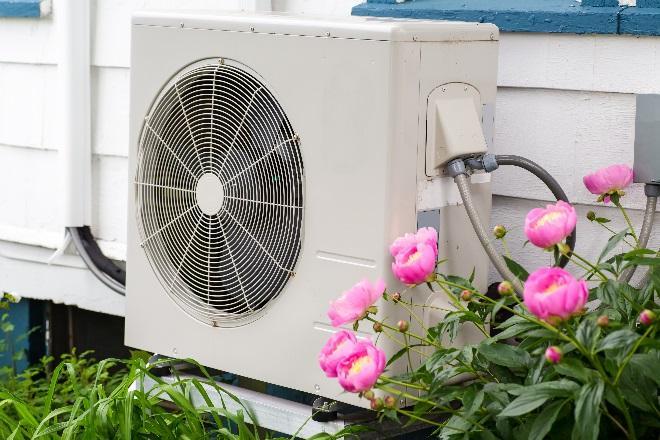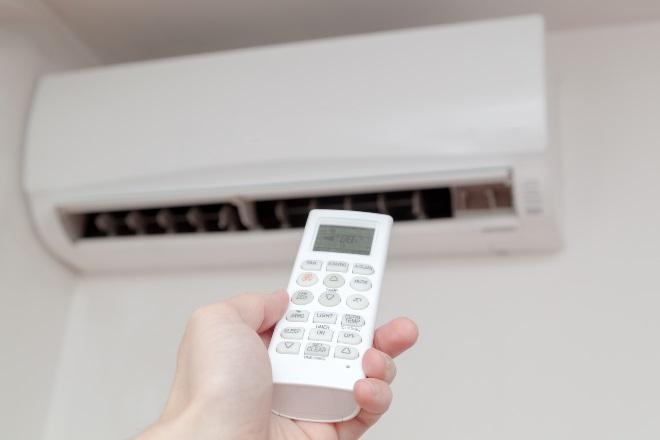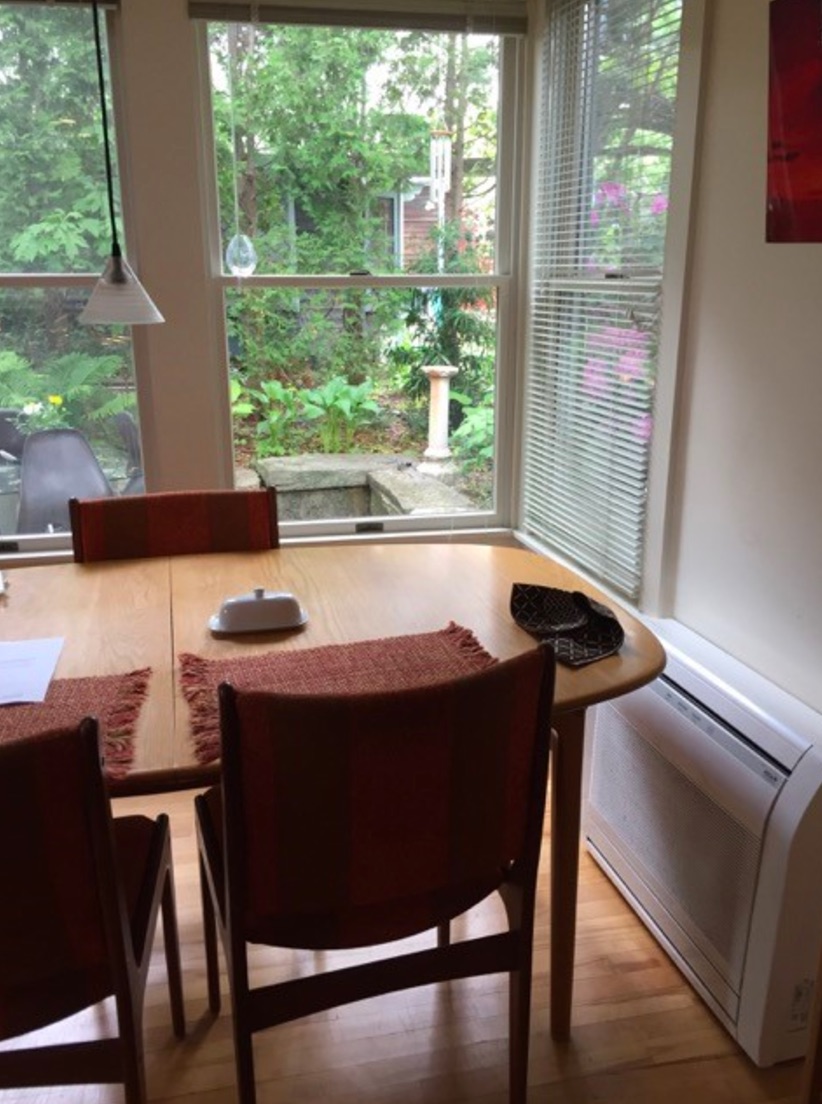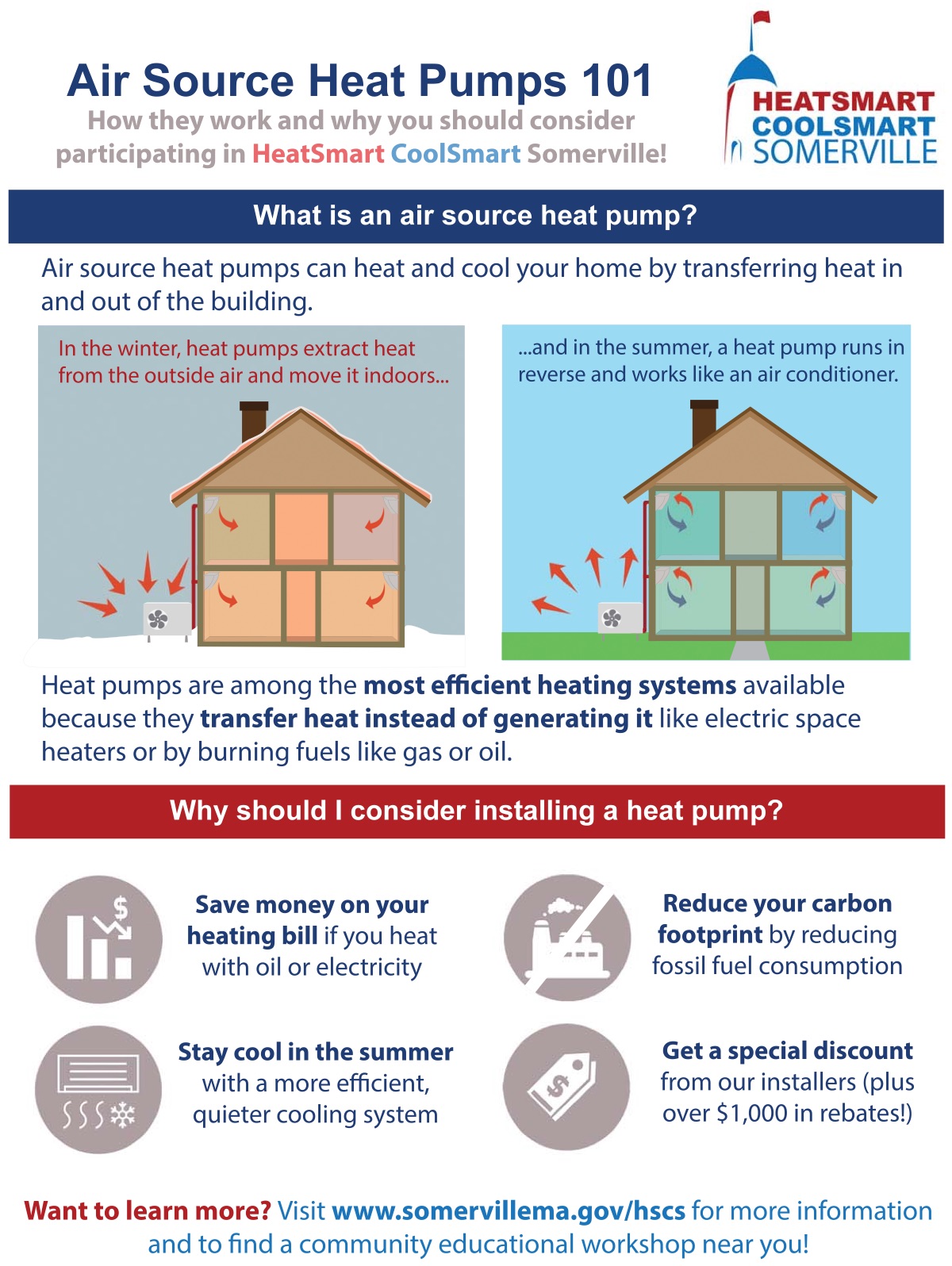HeatSmart/CoolSmart Somerville

Contact Information
What is an air source heat pump and how does it work?
Air source heat pumps are appliances that provide heating and cooling by moving heat into a building (for heating) or out of a building (for cooling). Heat pumps do not create heat, they just move heat from one place to another.
They accomplish this by using a refrigerant that absorbs heat from colder air in order to move that heat into a space with warmer air – much the same way that a refrigerator or air conditioner works except that it can move heat in both directions. A cold climate air source heat pump can do this even when the winter air is well below freezing: today’s cold climate air source heat pumps can extract heat from the air all the way down to -13°F. In the summer, the process is reversed and heat is absorbed from the cooler indoor air and moved to the warmer outdoor air.
Since it takes far less energy to move heat than it does to create heat, heat pumps are one of the most efficient home heating systems available.
All ductless air source heat pumps (heat pump) include an outdoor unit that will look similar to the unit below:

Ductless air source heat pumps, sometimes referred to as mini-splits, will have one or more indoor units that mount high on an inside wall. The image below shows a typical air source heat pump indoor unit mounted on a wall.


There are two primary types of air source heat pumps:
1. Ductless air source heat pumps – Each ductless system includes one outdoor unit connected to one or more indoor units with small copper lines.
These systems often come with remote controls that allow you to use them for heating, cooling, dehumidification or as a ceiling fan. Because each indoor unit can be controlled individually, you can reduce your energy use even more by lowering the temperature in rooms that are not being used.
Ductless air source heat pumps are the most efficient air-source systems and are often installed in homes and offices to supplement existing systems, usually in the most frequently used rooms like family rooms or bedrooms or hallways that can reach multiple rooms.
2. Ducted air source heat pumps – A ducted system has an outdoor unit that is connected to a building’s ductwork, much the same way that a furnace is connected to a home’s ductwork. With an air source heat pump, the system is not creating heat, but rather moving it from the outdoor air inside so that the air handler in your ductwork can circulate it throughout the building.
What are the benefits of using an air source heat pump?
There are many reasons why an air source heat pump could be a good fit for your home.
- Energy savings: If you heat with oil, propane, or electric resistance heat, you could save hundreds of dollars a year on your heating bill by installing an air source heat pump.
- High-efficiency cooling: Air source heat pumps also provide air conditioning or dehumidification and are more efficient than window units and most central air conditioning systems.
- Increased resiliency: Efficiently cooling even one room in a home may be a life-saver for people at risk of dying from excessive temperatures during heat waves due to a warming climate.
- Improved home comfort: In addition to providing cooling, heat pumps filter and dehumidify air, which can improve the air quality and comfort of your home.
- Flexible options: Heat pumps are a flexible technology that can be installed in homes of all shapes and sizes with different needs—whether you need a whole-home system replacement, you wish to increase the efficiency of heating one part of your home or you wish to add extra heating for part of your home that’s never warm enough.
- Lower your carbon footprint: As a clean heating and cooling technology, converting from burning fossil fuels to using an air source heat pump will help reduce your carbon footprint and dependence on imported fossil fuels. Consider cold climate air source heat pumps to be the cleaner alternative to natural gas!
Homeowners heating with oil, propane, or electric resistance: If you’re looking to replace your oil or electric heating with a cheaper, more efficient system—or if you’re looking for a way to get affordable, efficient cooling—heat pumps could be a great fit for your home or business. Air source heat pump offers a clean, lower-carbon alternative to a gas conversion.
Homeowners that heat with gas: A heat pump can still be a great option for cooling your home if you don’t have central air conditioning. Also, if you have a particularly cold spot or room in your home in the winter, a single heat pump can be a very efficient space heater (while also providing cooling!)
Homeowners with Solar PV: If you have a solar PV system, a heat pump can be a great addition to your home or business: heat pumps are highly-efficient heating and cooling systems that are powered by electricity. When combined, it means the electricity powering your heat pump is being generated by the sun—for free! These two technologies are often used together in creating “net-zero energy” homes—or homes that generate the same amount (or more!) of the energy they use over the course of the year.
Why are air source heat pumps referred to as a “clean” or “renewable” heating/cooling system?
Air source heat pumps are sometimes said to be “renewable” or “clean” heating and cooling systems because they do not create heat, but rather they move heat – a renewable resource found throughout the environment – from one place to another. This process is powered by electricity, which can also be sourced from renewable sources like solar, wind, or hydro.
About 12% of Massachusetts’ electricity sold by utilities is currently generated by renewable electricity (by law this has to increase 1% every year) and air source heat pumps generate fewer emissions per unit of heat than traditional home heating systems.
If you have solar on your roof or purchase green power, the energy you’ll be using to heat and cool your home will be virtually carbon-free!
How do the annual maintenance costs of an air source heat pump compare to other heating systems?
Annual system maintenance, which consists of cleaning air filters and an annual maintenance checkup for the outside unit, costs about the same as annual servicing charges for a boiler or furnace.
What is the lifespan of heat pumps?
Heat pumps have an expected lifetime of about 15 years—similar to the average furnace or air conditioner.
How complicated is installing a heat pump? How much time will it take?
A ductless air source heat pump can be installed in less than a day. It entails mounting indoor units on brackets attached to inside walls, running copper lines through a 3-inch hole in an outside wall to the outside unit and mounting the outside unit on a stand or on a bracket attached to the outside wall. Installers should assess whether there are any issues in your home that could cause an installation to take more than a day.
How well do heat pumps work in the middle of winter?
The newer cold climate heat pumps are designed to be used in a New England winter, providing efficient heating all the way down to 5°F while still continuing to provide useful heat all the way down to -10°F or lower.
On some of the colder days, your heat pump might not put out as much heat and you may need to use some backup heat to help keep warm. As such, the installer will keep your existing heating system in place (or install a backup) for the coldest days of the year.
Nervous about heat pumps shutting down in February? Don't be!Mainers and Vermonters have installed the most cold-climate heat pumps out of any New England state in the past few years—over 30,000 since 2013, and both states are significantly colder than Somerville in the winter! |
Installers can ensure that your heat pump and backup heating system are configured so that you aren't left shivering mid-winter!
Are there drawbacks to heat pumps?
A whole-home heat pump system will cost more than a typical furnace or boiler – closer to the cost of a furnace or boiler in addition to a central air conditioning system. However, if you heat with oil, propane, or electric resistance, you can expect the energy savings from your heat pump system to pay back the added cost over the course of several years.
Learn more about the rebates and 0% interest HEAT Loan available to help offset the added costs at the Pricing, Financing, and Savings tab.
Are there alternative designs available for homeowners concerned with aesthetics?
For homeowners that might not have suitable wall space or don’t like the aesthetic look of the wall-mounted indoor unit, floor-mounted and ceiling-mounted units are also available, though these units cost more to install.
If you have a furnace (and ductwork), ducted air source heat pumps can connect directly to a building’s ductwork so there are no indoor wall units to be seen. Ask you installer about what options will be available to you to make the heat pump indoor unit looks less intrusive.
How do air source heat pumps work with Mass Save no-cost Home Energy Assessment?
A Mass Save® Home Energy Assessment, which can help you identify opportunities to make your home more efficient. The best way to save money on your energy bill, be more comfortable year-round, and reduce your carbon footprint is to combine:
- Reducing the amount of energy your building uses through weatherization upgrades like insulation and air sealing; and
- Replacing your inefficient heating and/or cooling system with a high efficiency, cold climate heat pump.
Weatherization can help you to reduce the amount of energy you use, while heat pumps can help you use a more efficient, cleaner system for heating and cooling.
If you haven’t already completed a home energy assessment, we strongly recommends that you do so, as completing home efficiency and weatherization improvements before installing a heat pump is critical to making sure the heat pump performs well and is properly sized for your home heating needs.
Visit www.masssave.com, call 855-891-9899, or sign up online to learn more and schedule your assessment today.
Why is the City promoting heat pumps?
The City of Somerville is one of the leading cities in the nation in the fight against climate change. About half of the greenhouse gas (GHG) emissions that contribute to climate change from within our city comes from heating and cooling buildings. To meet our goal of becoming a carbon neutral city by 2050, we’ll need to find ways to “decarbonize” our heat (as well as our electricity supply and transportation). While fuels like natural gas are “cleaner” than oil and propane, natural gas alone won’t get us all the way there.
Heat pumps offer one of the best ways to accomplish our goals: heat pumps already provide a reduction in emissions compared to natural gas today even though our state grid is still mostly powered by fossil fuels. As Massachusetts’ electricity grid becomes more and more renewable (under state law), the emissions of heat pumps will continue to decrease.
Additionally, as our planet’s temperature warms, air conditioning will be more and more in demand as summers get hotter, wetter, and longer. Heat pumps also offer one of the highest-efficiency options for cooling—on par with the highest-efficiency air conditioners on the market.
Heat pumps can help the City reach its GHG emissions reduction goals while also saving Somerville residents and businesses money on energy bills and keeping them more comfortable year-round.
How much could I potentially save by switching my heating system to an air source heat pump?
Everyone’s heating (and cooling) bill is different—so the amount you could save on energy will vary depending on a number of factors, including what fuel you currently use to heat your home, how well insulated it is, what size and shape your home is, what temperature you keep your thermostat at, how many heat pump units you install, and more.
In general, the most important factor is what fuel you currently use to heat your home. If you heat with electric resistance or propane, you’ll probably see the most energy savings, depending on how much you currently pay. For the 2018/2019 winter season, the Massachusetts Department of Energy Resources estimated that the average Massachusetts home heated with air source heat pumps could save anywhere between $300 and $3,200 on annual heating costs compared to heating with electric resistance, oil, or propane.
If you heat with gas, heat pumps will be most valuable to you if you need air conditioning: a heat pump system will be more efficient than most AC systems. Heat pumps are also installed in particular zones of your home (like your living room or master bedroom), so you could just heat the part of your home you’re currently in instead of heating your whole home. Currently, heating with natural gas is less expensive than heating with an air source heat pump.
More information about Massachusetts household heating costs by fuel type can be found at the Massachusetts Department of Energy Resources' Energy Policy Planning & Analysis Division's website.
Video: Somerville Resident Mary's Heat Pump Installation
View HeatSmart CoolSmart Air Source Heat Pump Infographic (PDF)
Heat Pumps 101 Powerpoint Note: The incentives available during the 2017-2018 HeatSmart CoolSmart program have expired or changed. Please view the Rebate Guide for more information.
~80 Somerville residents and property owners attended three Heat Pumps 101 workshops.
Pricing, Financing, and Savings
How much will these heat pumps cost?
Every home is different and the pricing varies for every project. In general, for a base price you can expect to pay between $3,500 and $5,500 for a single heat pump (e.g. in your living room/kitchen, master bedroom) or $8,000 and $19,000 for systems with multiple indoor units.1 Completing home weatherization improvements prior to installing a heat pump can reduce the size and number of indoor units you’ll need to install (and the cost!).
Questions to ask your installer regarding the price:
- What are the prices for the following items, and are they included in the price quote?
- The heat pump indoor and outdoor units, as well as the labor costs for installing them
- 20 feet of piping to connect the indoor and outdoor units
- Mounting the system on the wall to keep the outdoor unit clear of snow2
- 12-year parts and compressor and 1-year workmanship warranties
- City permitting fees and labor costs for compliance
What factors could increase the cost of my system?
- The most common cost adders include:
- Additional piping to connect indoor and outdoor units. This could be significant for multi-zone systems with complex room layouts across multiple floors.
- Additional electrical work, such as an added electrical subpanel to meet the increased electricity demand a heat pump will require.
- Different indoor units, such as floor mounts, ceiling cassettes, and ducted indoor units will cost more.
- Additional labor costs for more complicated installations. Even though Somerville has a lot of similar three-deckers, the needs of each home and homeowner can be pretty different. This can lead to more complicated installations that will take more time to complete.
What are the permitting requirements for the City of Somerville?
Permitting requirements for air source heat pumps are different for every municipality. Please see the table below for a description of Somerville’s permitting costs. Property owners may apply for permits through the City of Somerville CitizenServe platform.
| Description | Cost |
| Building permit | $19 for every $1,000 of project costs |
| Electrical permit | $75 |
| Indoor wall switch | Varies by installer. |
Available Incentives
Available Financing
How can I make sure I understand and receive all rebates and incentives that apply to my system?
Ask your installer to explain the rebates and incentives to you while you are in the process of receiving a quote. Installers may also be able to help you complete and submit the paperwork required to process your rebates.
How much could I potentially save by switching my heating system to an air source heat pump?
Everyone’s heating (and cooling) bill is different—so the amount you could save on energy will vary depending on a number of factors, including what fuel you currently use to heat your home, how well insulated it is, what size and shape your home is, what temperature you keep your thermostat at, how many heat pump units you install, and more.
In general, the most important factor is what fuel you currently use to heat your home. If you heat with electric resistance or propane, you’ll probably see the most energy savings, depending on how much you currently pay. For the 2018/2019 winter season, the Massachusetts Department of Energy Resources estimated that the average Massachusetts home heated with air source heat pumps could save anywhere between $300 and $3,200 on annual heating costs compared to heating with electric resistance, oil, or propane.
If you heat with gas, heat pumps will be most valuable to you if you need air conditioning: a heat pump system will be more efficient than most AC systems. Heat pumps are also installed in particular zones of your home (like your living room or master bedroom), so you could just heat the part of your home you’re currently in instead of heating your whole home. Currently, heating with natural gas is less expensive than heating with an air source heat pump.
More information about Massachusetts household heating costs by fuel type can be found at the Massachusetts Department of Energy Resources' Energy Policy Planning & Analysis Division's website.
1Based on analysis of 105 rebate submissions to MassCEC from the cities of Boston, Cambridge, and Somerville using the same heat pump models with all HSCS Somerville rebates included for the following Mitsubishi cold-climate air source heat pumps: Model Numbers MUZ-FH06NA, MUZ-FH09NA, MUZ-FH12NA, MUZ-FH15NA, MUZ-FH18NA2, MXZ-3C24NAHZ2 (2 indoor units), MXZ-3C24NAHZ2 (3 indoor units), MXZ-3C30NAHZ2, MXZ-4C36NAHZ, and MXZ-5C42NAHZ.. Sample size too small for FH06NA. Costs for 3C24NAHZ2 with 2 indoor units not documented.
Feedback
Please submit website feedback using this form. Be sure to include:
Thank you for your feedback!

